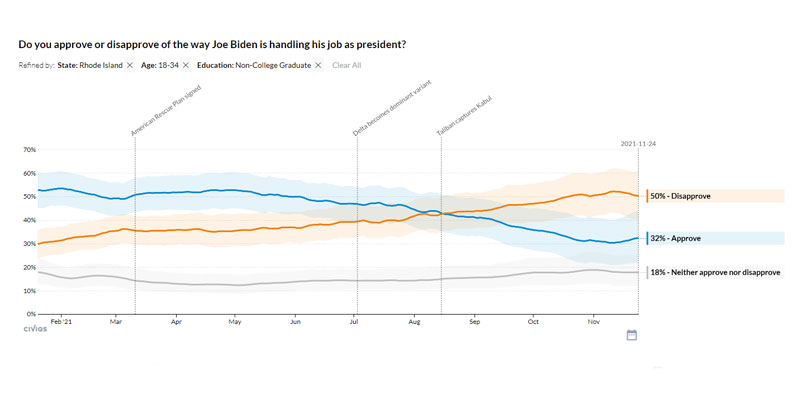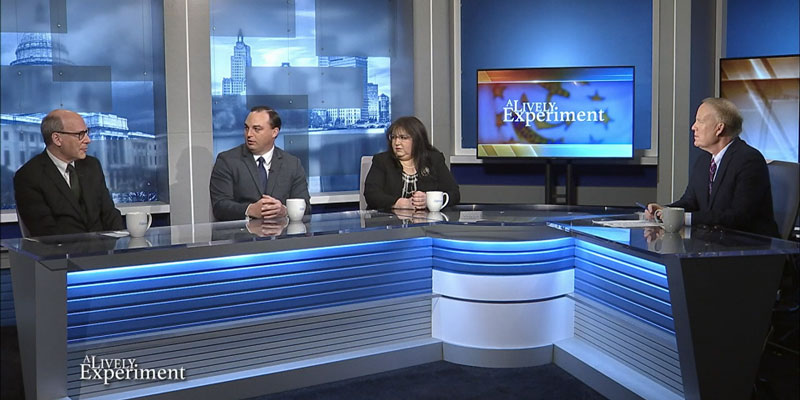Progressive Democrat state senator Sam Bell is fascinating to watch. Some years ago, he was a participant in a debate I helped organize, and he made a perplexing statement about the number of tax cuts Rhode Island government had enacted. Even watching such things closely, I had to go home and research what he might mean, and I concluded that, to him, any change in tax policy is a cut. Reduce the top rate, but increase taxes overall? A cut. Reverse course and move the policy back toward what it had been? That’s a cut, too.
Put simply, whatever he thinks will advance his progressive argument, that is what he’ll say.
And so, we see him implicitly defending his progressive allies in the teachers unions by saying RI’s standardized test scores are “preposterously bad” only because “the standards are very high.” Uh-huh.
It’s funny to see a progressive raise up “traditional” education practice as the standard against which new policies should be judged. It’s not so funny to realize that he’s casually excusing below-average performance and ignoring the fact that test scores have been “preposterously bad” for decades. He hopes his readers won’t be aware of any local history prior to a couple years ago, and unfortunately, for the most part, he’s probably right.
The best line in his essay is this pure con: “Standardized tests are flawed because education is, fundamentally, difficult to quantify.”
Note that he asserts this contrarian claim, rather than justifying it. One suspects this is a tautology; Bell doesn’t like what standardized tests show, and he doesn’t like the idea of objective, meritocratic standards, so they must be “flawed,” which means the real thing that he knows people value (i.e., education) must be something else that is “difficult to quantify.”
Step back (especially in light of the “traditional education” on which Bell relies for other claims), and you’ll see how absurd it is to say education is difficult to test. There are few things we have so much experience testing! Indeed, it is the nature of education that the final product is contrived; teachers deliberately work confounding real-world variables out of the lessons so they can isolate and teach the underlying principles. Making them teachable makes them testable.
The problem for Bell and his comrades is that results have cratered since they took control, so now their mission is to convince people not to notice.
Featured image by Vahid Moeini Jazani on Unsplash.
[Open full post]Of course, anybody who has known someone who refused to see a doctor about a broken bone knows that self-healing doesn’t always mean a desirable condition. Sometimes bodily and social healing mechanisms render appendages less useful, or even liabilities.
Anyway, the lesson comes to mind after reading Erika Sanzi’s concerns that school administrators and teachers have increasingly been making claims about current events, which often means they’re teaching students things that prove to have been incorrect. Worse, these don’t tend to be merely factual errors, but falsehoods that shape the way impressionable children see the world, country, and community in which they live. The potential for profound harm is significant. Sanzi suggests:
I suspect I am not an outlier when I say that if schools are going to wade into fast moving current events and fraught questions that challenge us in their complexity, they need to know what they’re talking about. If school boards, school leaders and teachers can’t commit to that reasonable and basic standard of accuracy and honesty (and a commitment to publicly correcting the record when they get it wrong), they might need to admit they have become propaganda outlets willing to miseducate and lie to the students and families they claim to serve.
A hierarchy of preferences is appropriate. The ideal would be that schools would not go down this path. In response to my post about the ideological politicization of schools, yesterday, the tech director for a Rhode Island charter school (who doesn’t associate his job with his social media, so I won’t do so) implied that, yes, education is inherently political. I replied that, to the extent it is political, it isn’t a justifiable taxpayer expense nor government mandate. If we’re teaching apolitical basics and preparing children to live in our society as it is, then government can ask us to foot the bill. If it’s about fundamental transformation of society, then it’s indistinguishable from religion and ought to get off the taxpayers’ vein.
Where administrators can’t or won’t avoid wading into current events, they should take pains to correct their errors to the same people they misled. Consciously or not, they no doubt fear that correcting such errors would reduce their credibility the next time they make proclamations. Writers of opinion can tell them, however, that credibility will be lost anyway — albeit perhaps more slowly — such that the long-term credibility calculation requires corrections of error. Especially for institutions like schools, correcting errors is the only distinguishing factor between truth-seeking and propagandizing.
Even if schools can avoid losing credibility with their students and current parents, they lose it with the public when they become political. This is particularly dangerous for an institution that (1) asks parents to trust it to teach things that are true to their children, and (2) relies on public good will and funding to survive.
Featured image by Kim Gorga on Unsplash.
[Open full post]Perhaps it feels redundant or like beating a dead horse for me to direct readers to Mike Gonzalez’s list of “The Five Lies of CRT,” but I have a feeling it’s a topic to which we have to return with reinforcements constantly. The attempted gaslighting from radicals is simply too dogged. Complacency is an enemy.
Here are the five lies:
- CRT is not taught in schools
- CRT is just a way to give previously marginalized people the attention they have lacked
- CRT is not Marxist
- Those opposed to CRT just don’t want history taught
- The Use of CRT is a cynical ploy by Republicans
Over the years, I’ve found it to be a common attitude among those who wish to radically transform our country that labels conveying something unfavorable aren’t permitted to apply to them. This attitude incorporates both terms that are historically unfavorable (e.g., “fascist”) and terms that become unfavorable because of what they describe (e.g., “progressive”), at which point they are said to be inaccurate descriptors.
Referring to lie #1, for example, it’s simply a fact that there’s a direct line from CRT to the changes that the education establishment is currently hiring radical contractors to implement in their districts. Here’s a document, for example, from an overview of the Highlander Institute’s Culturally Responsive & Sustaining Pedagogy (CRSP) Framework:
In one study, mostly remedial level Latinx students enrolled in a Chicano Studies course and participated in an action research project from a critical race theory lens. By the end of the class, all students reported their writing and reading skills had improved, and 93% said they felt better able to attend college. Accordingly, 88% of enrolled students graduated with 58% attending college, significantly higher than the national averages for Latinx students at the time (59% and 26% respectively). In interviews, students described how they learned the struggles they faced were not necessarily due to personal shortcomings but a result of systemic oppression, which increased their motivation in school. Others reported feeling empowered and motivated while learning about their own history rather than the dominant Eurocentric curriculum.
We should note that, if we take the results at face value, the decisive factor in improvements appears to have been motivation, and there are surely ways to increase that without resorting to racism. The important point for my purposes in this post, however, is the casual reference to a “CRT lens.” That’s how this works.
The more common term in the paper is “Critical Consciousness,” as in, “Critical consciousness has been defined as “the ability to recognize and analyze systems of inequality and the commitment to take action against these systems.” To wit, “equity audits” and “anti-racism.”
The curious reader needn’t dig too deeply to pull the pieces together convincingly. For example:
Brazilian educator Paulo Freire (1970) conceived of critical consciousness while working with adult laborers in Brazil. Freire realized that inequality is sustained when the people most affected by it are unable to decode their social conditions. Freire proposed a cycle of critical consciousness development that involved gaining knowledge about the systems and structures that create and sustain inequity (critical analysis), developing a sense of power or capability (sense of agency), and ultimately committing to take action against oppressive conditions (critical action).
Read up even superficially on Freire, and you’ll find the relation to what’s happening in our schools, as well as Marxism, right on the surface. The guy took Chairman Mao’s Cultural Revolution as a model.
The idea is that education is inherently political, inasmuch as it either helps students to actively participate in the culture into which they’re being raised, or it teaches them to deconstruct and disrupt it. The former is what we fund education so lavishly to accomplish, but it is being hijacked by people whose goal, again, is to make our children unhappy and incapable of functioning in our society.
Featured image, an iconic image from the Chinese Cultural Revolution.
[Open full post]Upon discovering that it’s permissible to sip hard liquor, I’ve been getting into whiskey in the past year. From that perspective, I find this approach from Heaven Hill distillery simply bizarre:
To celebrate what they view as a just outcome, some whiskey lovers began purchasing bottles of “Rittenhouse Rye.” The brand name is derived not from the recent court case but from Rittenhouse Square in Philadelphia, an open-space park designed by William Penn and named for an early 19th-century papermaker. …
Heaven Hill evidently wasn’t happy about the free advertising, tweeting, “We have been disheartened to learn that some individuals and businesses have been using our Rittenhouse Straight Rye Whiskey brand to celebrate the Kyle Rittenhouse case verdict, despite the profound loss of life from those events.”
Presumably, the company has a better sense of who buys its products than I do, but these declarations about who should buy their products and for what personal purposes used to be limited to self-righteous musicians. We should return to that state of affairs.
[Open full post]Via Stacey Lennox, who looks at Biden’s approval/disapproval ratings across all states for PJ Media, comes a fascinating tool that may prove useful in the toolboxes of anybody who writes about or engages in politics.
It’s an interactive poll tool from Civiqs that allows the user to cut up the data by various demographics in one of the most-comprehensive ways I’ve ever seen for this sort of tool.
The link above shows the trendline for Biden from election on, and it isn’t pretty. Although the picture has improved a little over the past couple weeks, he’s currently underwater by 16 percentage points, with a 53% majority disapproving. In fact, the percentage disapproving is larger than the percentage approving for every age group, every education level, and both sexes. Only among Democrats, minorities, and seven states is he above water.
Rhode Island isn’t one of those states, and if you click on the state’s name on the left-hand sidebar, the tool resets all of the charts for the Ocean State. Here, he’s only under water by one percentage point (45:44), but that’s a relatively recent reversal, after his high of 57% approval in April. In Rhode Island, Biden picks up plurality approval from people over fifty, postgraduates, and women.
It’s interesting that disapproval is strongest among younger groups. Click for the 18-34 group, and you see disapproval at 48%, over 35% approval, and that’s with a bunch of Democrats who appear reluctant to say anything more than “neither approve nor disapprove.” Somewhat surprisingly, Biden hits 50% disapproval among non-college graduates, which would include the youngest portion of the group as well as the working class. Note that for all age groups, the non-college graduate disapproval is 47%, so the youth factor appears to be more relevant than the “working class” experience.
Among the young, Biden loses women, and male disapproval hits 59%. He also loses ground with minorities. Among all black Rhode Islanders, his approval:disapproval is 61:22; among Hispanics/Latinos, it’s 60:29. Under 35, that drops to 41:35 and 50:33. Narrow the picture to non-college graduates, and he nearly loses blacks, at 39:36. He actually does lose the young men in this category, who disapprove by 43% versus 40% approval.
There may be some opportunity to shift voters, here. After all, the same results for Donald Trump weren’t inverted. They disapproved of him more strongly than their elders, too. The disapproval of Biden isn’t just a reflection of partisan leanings, in other words.
What that means, I don’t know, but I’ll be digging into all of Civiqs’ results to see if I can figure it out.
[Open full post]Daniel Greenfield’s look into three billionaires funding the Democrat dark money machine is worth a read:
Politico recently reported that the Sixteen Thirty Fund, the leading dark money machine of the Left, had pumped $410 million into Dem 2020 efforts to defeat Trump and Republicans.
The Sixteen Thirty Fund had raised a record $390 million that year and half the money came from just 4 donors. While the names of the donors are secret, the article did note the names of three major known STF backers: Pierre Omidyar, Hansjörg Wyss, and George Soros.
Funny how the involvement of billionaires is only lamented by RI’s elected officials when they help the other side.
[Open full post]As I predicted, the murderous attack on a Christmas Parade in Wisconsin isn’t getting as much air time as it objectively merits:
Prominent media outlets have already lost interest in the vehicular massacre that took place on Sunday at the Waukesha Christmas parade, a Washington Free Beacon analysis has determined.
Since I last wrote about it, the narrative that the assailant was running from a crime scene hasn’t panned out, so the attack appears even more malicious. This moves the story from the “ambiguous politics” path toward the “undermines progressives” path, which dictates less coverage.
[Open full post]Referring to an appearance by National Education Association of Rhode Island director Bob Walsh on A Lively Experiment, Erika Sanzi plainly describes a reality of local media.
Walsh’s offending claim was that Nicole Solas shouldn’t call herself a “stay-at-home mom” when she’s “in a different community at a different school committee meeting screaming at the top of [her] lungs about things that aren’t happening.” Writes Sanzi (emphasis added):
The most charitable interpretation is that Walsh was using hyperbole to make a point, but the simple truth is that he lied. He wasn’t asked to provide an example or cite specific instances, which is too bad since he would not have been unable to come up with one. Turns out he is the one talking about “things that aren’t happening.”
That’s the not-so-hidden secret of these shows. They typically aren’t structured to foster debate or inform the public. One or other of the insiders who appears on them would therefore risk looking bad and avoid the shows and their hosts. Rather, each participant is there to play a role and offer the talking points for the group he or she ostensibly represents.
Everything is like this in Rhode Island’s political sphere. With few exceptions, business advocacy groups, for example, aren’t in their positions actually to figure out what business owners want and need and then advocate for them. They’re the establishment’s chosen representatives to speak for businesses and convey the establishment’s wishes back to their members.
The labor unions are very similar. Oh, the organizers will claim they’re small-d democratic institutions in which all members get a vote, but the notion that teachers, construction workers, nurses, government office workers, and others really want their labor unions to be the driving force of Rhode Island’s radical progressive movement has to be proven, because it seems unlikely on its face (to say the least).
One certainly suspects Rhode Island’s teachers, the majority of whom are women, don’t feel represented by a wealthy man who goes on television to insist that stay-at-home moms lose their identity unless they keep their mouths shut.
The reality is that most teachers in Rhode Island public schools still don’t know that they’re free to leave the union with absolutely no loss of contractual rights or protections. The unions lie to them about this. Unions also propagandize them with fear about what their profession would look like absent Bob Walsh’s advocacy.
So, they continue to accept an arrangement that subordinates them to a group of aggressive ideologues (who are mostly wealthy men, by the way). Naturally, the establishment, including the local news media, is just fine with that arrangement.
[Open full post]Among the many mailing lists that send messages to my email account is one for the Providence College friars — the actual friars, that is — and this week, one of them sent a Thanksgiving message with an anecdote about a foreign novitiate. This newcomer to our country and to the religious order expressed surprise and admiration that our country sets aside a public day of thanksgiving to God.
Seeing the day through the young man’s eyes can be a bit startling for a born-and-raised American. Wait! That can’t be what the day is for, can it? Isn’t it really just a celebration of early settlers’ coming together with the indigenous people of the continent? Sure, they might have been offering thanks to God, but we’re recognizing them, not Him, right?
Well… not according to George Washington:
By the President of the United States of America. a Proclamation.
Whereas it is the duty of all Nations to acknowledge the providence of Almighty God, to obey his will, to be grateful for his benefits, and humbly to implore his protection and favor—and whereas both Houses of Congress have by their joint Committee requested me “to recommend to the People of the United States a day of public thanksgiving and prayer to be observed by acknowledging with grateful hearts the many signal favors of Almighty God especially by affording them an opportunity peaceably to establish a form of government for their safety and happiness.”
Now therefore I do recommend and assign Thursday the 26th day of November next to be devoted by the People of these States to the service of that great and glorious Being, who is the beneficent Author of all the good that was, that is, or that will be—That we may then all unite in rendering unto him our sincere and humble thanks—for his kind care and protection of the People of this Country previous to their becoming a Nation—for the signal and manifold mercies, and the favorable interpositions of his Providence which we experienced in the course and conclusion of the late war—for the great degree of tranquillity, union, and plenty, which we have since enjoyed—for the peaceable and rational manner, in which we have been enabled to establish constitutions of government for our safety and happiness, and particularly the national One now lately instituted—for the civil and religious liberty with which we are blessed; and the means we have of acquiring and diffusing useful knowledge; and in general for all the great and various favors which he hath been pleased to confer upon us.
and also that we may then unite in most humbly offering our prayers and supplications to the great Lord and Ruler of Nations and beseech him to pardon our national and other transgressions—to enable us all, whether in public or private stations, to perform our several and relative duties properly and punctually—to render our national government a blessing to all the people, by constantly being a Government of wise, just, and constitutional laws, discreetly and faithfully executed and obeyed—to protect and guide all Sovereigns and Nations (especially such as have shewn kindness unto us) and to bless them with good government, peace, and concord—To promote the knowledge and practice of true religion and virtue, and the encrease of science among them and us—and generally to grant unto all Mankind such a degree of temporal prosperity as he alone knows to be best.
Given under my hand at the City of New-York the third day of October in the year of our Lord 1789.
We do well to reread this text as an antidote to the calls to transform Thanksgiving Day into yet another day of self-recrimination and penance for the sins of our ancestors of European origin.
The contrast with the proclamation of the current occupant of the White House is significant, even though he (surprisingly) resists ritual denunciation. Joe Biden lists various categories of people for whom “we” are to be grateful and then turns the spotlight on himself:
For the First Lady and me, Thanksgiving has always been a cherished time to enjoy annual traditions that have evolved into sacred rituals with our children and grandchildren: throwing the football, preparing family recipes, lighting candles, and setting the table.
We have gone from drawing from the sacred for our traditions to establishing traditions as sacred. That is, we derive profundity not from a power greater than us, but from the small things we do regularly.
One wonders whether it was the implicit secularization of the Thanksgiving Day that left it open to attack. After all, we can cease to dedicate Thanksgiving to God, but we still need something to celebrate, and if that something is a historical event or group of people or annual practice of our families, then we open the door to criticism of these things for their imperfect humanity.
Take special note of President Washington’s call to “beseech” God “to pardon our national and other transgressions.” Make what sacrifices we may to representatives of those against whom our nation has transgressed, nobody other than God is in a position to offer adequate forgiveness.
Featured image by Norman Rockwell on WikiArt.
[Open full post]As I’ve thought about it, this morning’s post on New England governors’ poll results ended a bit short. I closed with a suggestion for Democrats, but what about Republicans?
Considering the huge jump of New England’s three Democrats from the bottom of the national list in 2019 to the top now, two possibilities come to mind, with both existing at the same time. In any case, the politicians, themselves can’t be the central target of a conservative opposition.
The first possibility is that their popularity right now, after harsh COVID restrictions, is real. In that case, persuading our neighbors has to be the core goal. Sometimes, making the people for whom they’re likely to vote look bad might help, but that hasn’t proven very effective in the Ocean State’s recent past. The cultural message that people are just supposed to vote for Democrats is too deeply ingrained. Thus, progressives can win by focusing on the corruption of establishment Democrats, but Republicans have a harder time of it.
The second possibility is that the Democrat governors’ ability to win office was strong even if their unpopularity in the past was real. That is a reflection of the opposition’s inability to produce a viable alternative. The internalized master lever that the electorate carries around in their minds is part of the problem, here. The incentive structure of state politics is another part, giving Republicans little reason to build careers in politics or jump into it midcareer.
And of course, part of the problem is that Republicans have lost the knack for finding, supporting, and unifying behind candidates.
A step-by-step plan for escaping this rut would be a massive undertaking, but the outlines of a solution are pretty clear. Conservatives need to develop a positive story and platform that can achieve buy-in throughout its big tent and motivate competent people to (1) get involved, (2) run for office, and (3) put aside their differences for the sake of working together.
Obviously, that’s easier said than done, but we have to start somewhere, and the best time to agree on core principles is with the very first one. The constant presence of New England’s Republican governors at the top of the national popularity list proves the possibility of success.
Featured image by Justin Katz.
[Open full post]








